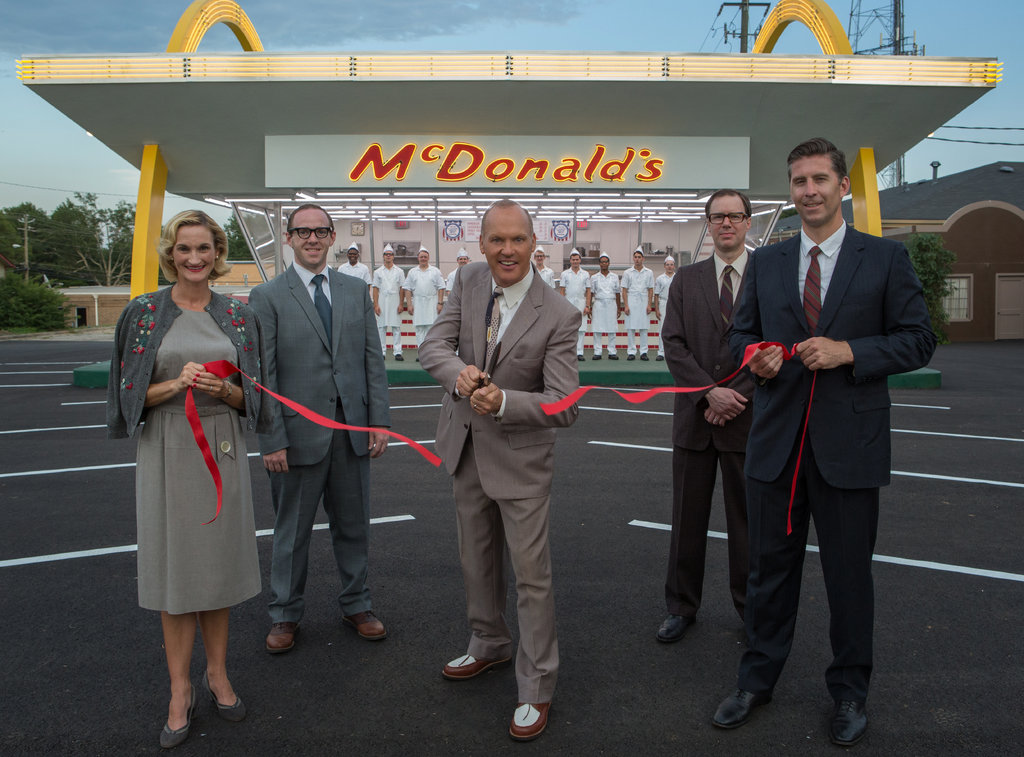I spent a lot of the last few years traveling. Yet, I never really got very homesick? How is that possible? Is Europe just that cool? Well, yes, but also because there are little pieces of America scattered across the globe, none more prevalent than McDonald’s. From the Champs-Elysees to a small Norwegian oil town and beyond, McDonald’s has grown from its California roots to an international staple. However, those roots are deep seeded in American Capitalism, no doubt about it.
The Founder showcases the war for the McDonald’s. The McDonald brothers, Dick (John Carroll Lynch) and Mac (Ron Swanson himself, Nick Offerman) launched a successful little operation in San Bernardino, California called McDonald’s, a car hop built around getting your food as quick as possible, revolutionary at the time. However, the brothers had no idea how to capitalize on their brilliant business. Enter Ray Kroc (Michael Keaton), a struggling milkshake machine salesman who lives a mediocre existence in the Illinois suburbs. However, once Ray experiences McDonald’s, he sees his big break and capitalizes on it. To succeed though, Ray starts to realize the brothers might be more of a burden than an asset, and starts to postulate how to get them out of the way.
It’s only fitting that McDonald’s is the perfect encapsulation of the American capitalist experience, warts and all. The positive: The idea’s the fast food chain is built on are well conceived and should be experienced by everyone: fast service and family friendly dining. McDonald’s growth is due to a man who works really hard and believes in a great idea when he sees one. In addition, he does listen to smarter people than him and incorporate what they present to him, like milk powder or investing in real estate instead of building franchises. Now, the REALLY negative: capitalism is 100% Machiavellian: if you’re not in power, you want it, and at the top, you try to keep people out who threaten you, like say, using your money to hire lawyers to push out your business partners. Capitalism also inevitably leads to the lecherous and greedy to come out on top more often than not, twisting great collaborative efforts into exclusively money making operations that make workers as soulless as the business or dropping a supportive wife because she “lacks vision.” Worst of all, we see how hollow all this success can be; capitalism is built around wanting more. Period. Full Stop. Even when Kroc gets everything he wants, we see he continues to push the business farther and farther to get himself bigger pieces of the pie. Watching McDonald’s incorporate, like one of their sandwiches, is enjoyable on the surface but leaves you a little queasy and empty and regretful.
It’s hard not to want to believe Michael Keaton. When we first meet Kroc, he’s already a believer, listening to tapes about working hard being better than great ideas, but it all feels a bit delusional, as if he’s convincing himself his life doesn’t suck and all he has to do is work harder. Keaton gets better when he sees his chance to capitalize and grow someone else’s great idea and pass it off as his own. His sad-sack sales pitches turn very quickly into sinister cockiness infused with a stunning lack of empathy. Ray Kroc is most important to Ray Kroc, and watching Keaton convince himself that he is the true founder of this company, or that every great business idea for the company was his because it makes him more, is as terrifying as it is riveting. As a result of Keaton captivating us, the movie forgets to develop everyone else. The McDonald Brothers are the most developed: kind businessmen who want to realize a dream, not make $$$$. However, once Keaton moves in on them, they exist to just say No and act incredulous at what Kroc is doing. Laura Dern and Linda Cardellini are portrayed probably as Kroc would portray them: ancillary characters existing to support the greatest man on the face of the Earth. As such, when Keaton isn’t on screen working on McDonald’s the movie drags significantly.
I used to be proud to say I lived near the original McDonald’s in Des Plaines, Illinois. However, I look at that property now and shiver a bit, knowing that lie is one of many spun up by a man who so believed in the American capitalist spirit that he convinced everyone to buy into his dream. Although, I do laugh a little knowing he had to outsmart Ron Swanson, the greatest capitalist of all time, to get there.

